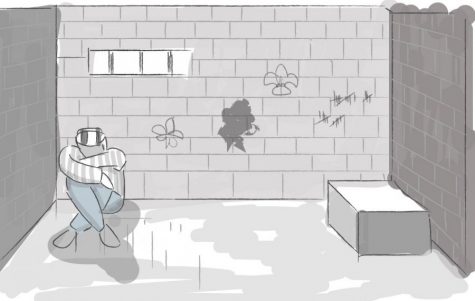Dehumanizing conditions in Louisiana prisons disregard inmate rights
August 28, 2019

Emma King is a member of Newcomb Prison Project and recently completed an internship with the Promise of Justice Initiative/Capital Appeals Project.
Inhumane prison conditions in Louisiana reflect the deeply flawed U.S. criminal justice system as a whole. A recent survey of more than 700 incarcerated people in Louisiana — a joint effort by the American Civil Liberties Union of Louisiana and other groups — sheds light on atrocious conditions in solitary confinement.
More than 75% of the respondents reported being held in solitary confinement for more than a year. They described being forced to clean toilets with their bare hands, sleeping on insect-infested floors and other inhumane conditions.
The Louisiana Department of Corrections disputes these claims, despite the fact that they are corroborated by similar reports from the Vera Institute of Justice. While I have become acquainted with the criminal justice system through classes and independent research, nothing has taught me more about the atrocious conditions incarcerated people endure than meeting one-on-one with men who have served more than 20 years in the “Alcatraz of the South” this summer.
We interviewed 709 people in solitary confinement – three quarters of them had been held for more than a year. Read our report with @SolitaryWatch and @JSRI_JustSouth on why it’s time to #StopSolitary https://t.co/wQrREeCYFO pic.twitter.com/mF1wF8AIEp
— ACLU of Louisiana (@ACLUofLouisiana) June 25, 2019
As an intern with the Promise of Justice Initiative/Capital Appeals Project, I visited the Louisiana State Penitentiary, infamously known as Angola, to meet with clients serving life sentences. Not only did I see inhumane prison conditions, I also learned that there is virtually no check on the power of the prison guards and wardens.
Inmates are subject to harassment by guards, and if they file an Administrative Remedy Procedure, often nothing is done, or worse — they face retaliation for communicating their grievances. One man I spoke with filed an ARP after mistreatment by a guard and was promptly sent to extensive lockdown as punishment for months.
He was penalized for exercising his right to make a complaint. Extensive lockdown means being confined to a cell for 23 hours per day with the remaining hour left to shower, walk around and make any phone calls or communication needed.
It has all the dehumanizing features of solitary confinement but with a cellmate to share in the misery. The only way to get off extensive lockdown is by passing a review board, but even passing does not ensure release back into general population.
One client passed his board more than a month ago and remains in extensive lockdown today. While corruption is rampant within prison staff and red tape leads to unthinkable delays in virtually every facet of the prison, the injustices in prison extend even further.
People in prison are constitutionally guaranteed health care, but it is rare that their needs are actually met. Prisons cut corners, sweep serious illnesses under the rug and delay care for months and years. In the report, 79% of the individuals surveyed called their medical care during incarceration poor.
Incredibly serious and fatal illnesses such as cancer are often neglected until it is too late, especially for those serving life sentences. One man I spoke with saw his friend and cellmate of 15 years die in front of him, vomiting enormous clots of black blood until he died. Amid shouts to guards for help, no one arrived.
Mental health is also seriously neglected in Louisiana’s prisons.
Desperation, hopelessness and mental illnesses are only exacerbated by prison conditions, and suicide is far from uncommon.
Visiting Angola gives just a glimpse into the lives of incarcerated people in Louisiana. To think that people spend decades in a place that treats them like animals is difficult to fathom, but raising awareness is the only way to combat the problem.
Louisiana has the highest incarceration rate and one of the highest wrongful conviction rates in the country. Until the recent passage of Amendment 2, Louisiana was one of only two states to allow non-unanimous jury convictions in felony cases. That means that until months ago, in a state that is a leader in wrongful convictions, you could go to prison for life or even face the death penalty without a unanimous jury verdict.
That fact is terrifying.
A new report based on the largest survey ever conducted of people living in solitary details the devastating impact of this dehumanizing practice. Read our new report – #LouisianaonLockdown – with @SolitaryWatch and @JSRI_JustSouth https://t.co/9L6UcLmgCc #StopSolitary pic.twitter.com/mDuTu0g134
— ACLU of Louisiana (@ACLUofLouisiana) June 25, 2019
While the passage of Amendment 2 was certainly a meaningful step in the right direction for criminal justice reform in Louisiana, there is still a mountain of work to be done. In particular, the heinous conditions and treatment of people in prison must be addressed.
For people who do not have a strong support system outside of prison, as is the case for many incarcerated people, they have no one to help them fight against the mistreatment and injustice they face on a daily basis.
So much of Louisiana’s prison conditions are cruel and unusual, facilitating the criminal justice system’s ability to take advantage of underprivileged populations through institutional racism and exploitation. In any other developed country, forcing people to work for as little as two cents per hour all day in the blazing sun would be considered slavery. But in Louisiana, this is the reality for thousands.










Crystal Jackson • Apr 27, 2020 at 12:09 am
Trying to stay on top of things